Key takeaways:
- Rejection is a universal experience for artists and journalists, often leading to feelings of self-doubt and questioning one’s worth.
- Viewing rejection as a learning opportunity can foster resilience and encourage growth in creative pursuits.
- Community support and sharing personal rejection stories provide comfort and reinforce the understanding that rejection is part of the creative journey.
- Constructive feedback, even when delivered through rejection, can enhance skills and inspire future projects.
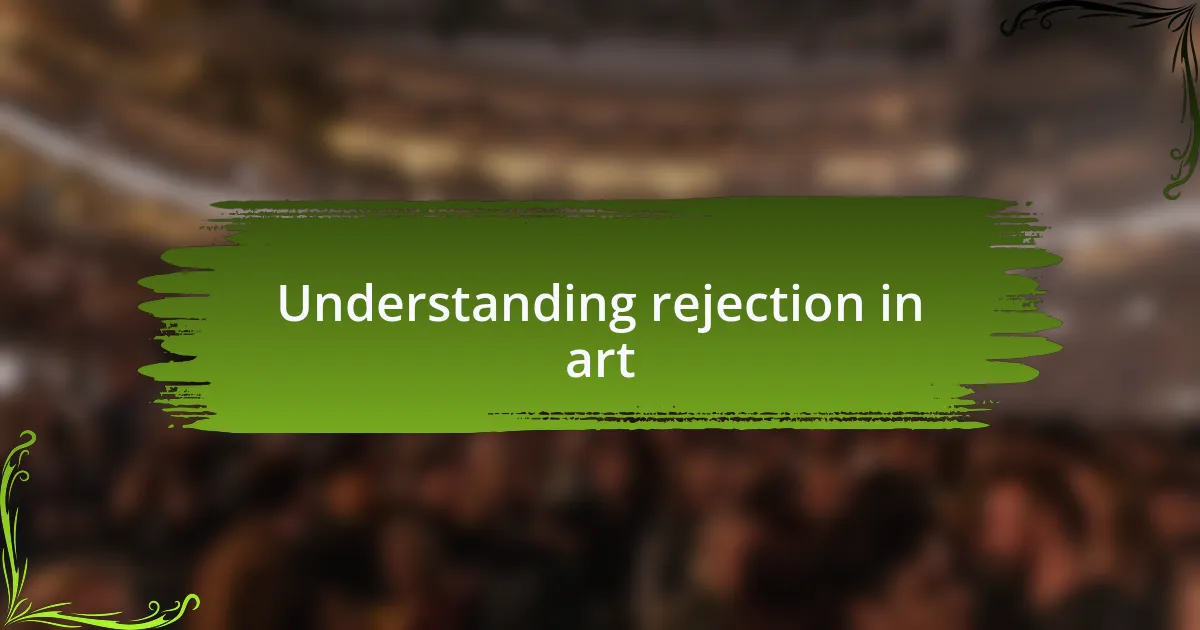
Understanding rejection in art
Rejection in the art world is a universal experience that strikes at the heart of creative expression. I remember submitting my first piece to a local gallery and feeling a mix of excitement and anxiety, only to receive a polite rejection email days later. It made me wonder, why does rejection hurt so much, especially when it feels so personal?
As artists, we often invest our emotions and identities into our work, making the sting of rejection feel like a reflection of our worth. I’ve seen peers experience a deep sadness after their projects were turned down—it’s as if their visions are dismissed alongside them. Have you ever felt that way? I certainly have, and it took time to understand that rejection doesn’t diminish my abilities but often speaks to the subjective nature of art itself.
Every rejection can be a stepping stone rather than a stumbling block. I once met an artist who, after facing countless rejections, decided to hold a solo exhibition showcasing the pieces that “didn’t make the cut.” The turnout was astonishing, validating that what one gallery may overlook, another may celebrate. This experience taught me that rejection can guide us toward unique opportunities, encouraging resilience in our artistic journeys.
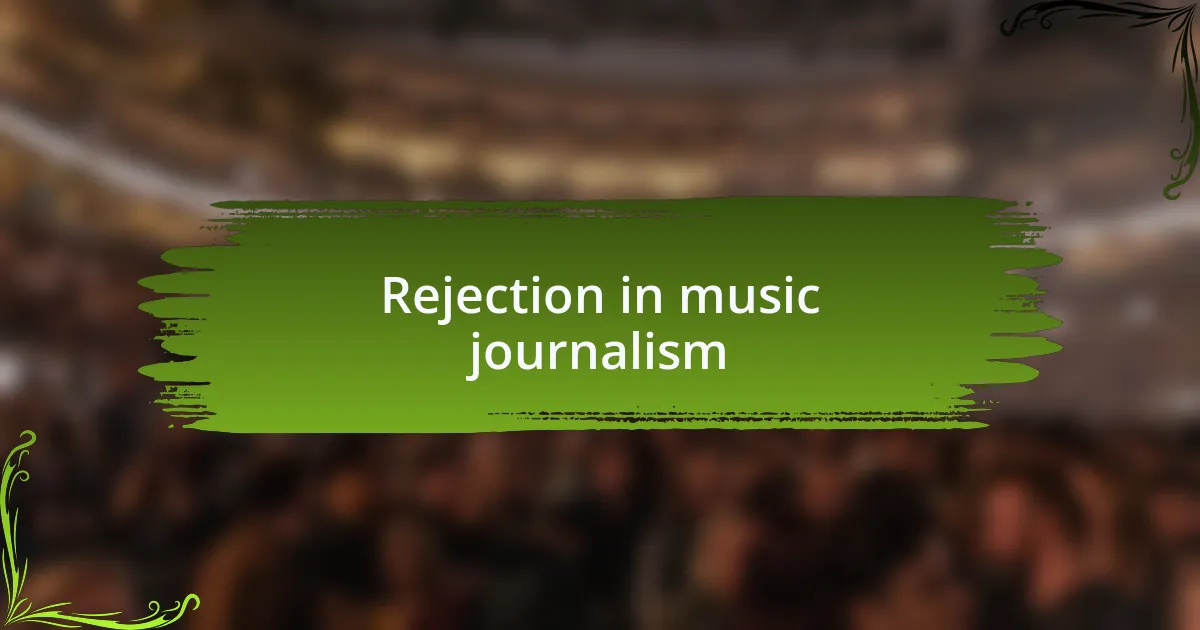
Rejection in music journalism
Rejection in music journalism often feels like an inevitable part of the gig, and I’ve certainly had my share. I remember pitching a feature on an emerging band I adored, only to have it rejected with the feedback that it didn’t align with the publication’s current focus. At first, I was deflated, questioning whether my taste or judgment was flawed. Isn’t it strange how much weight we place on the opinions of others?
The personal investment in writing makes rejection sting even more. There was a time when I put my heart into an album review, excited to share my thoughts, but was met with silence from the editor. That experience left me wondering if my voice truly mattered. I realized that while it’s disheartening, such moments are part of the landscape in this field. How many times have I heard successful journalists share similar stories? Countless.
However, rejection can foster growth and new perspectives. After a series of declined pitches, I decided to start a blog showcasing my music critiques and personal narratives. Each piece published there felt like an act of defiance against rejection, not just a coping mechanism. Who knew that my voice would resonate with a niche audience and ultimately lead to new opportunities? This journey illuminated that what might be overlooked or misunderstood in one avenue can flourish beautifully in another.
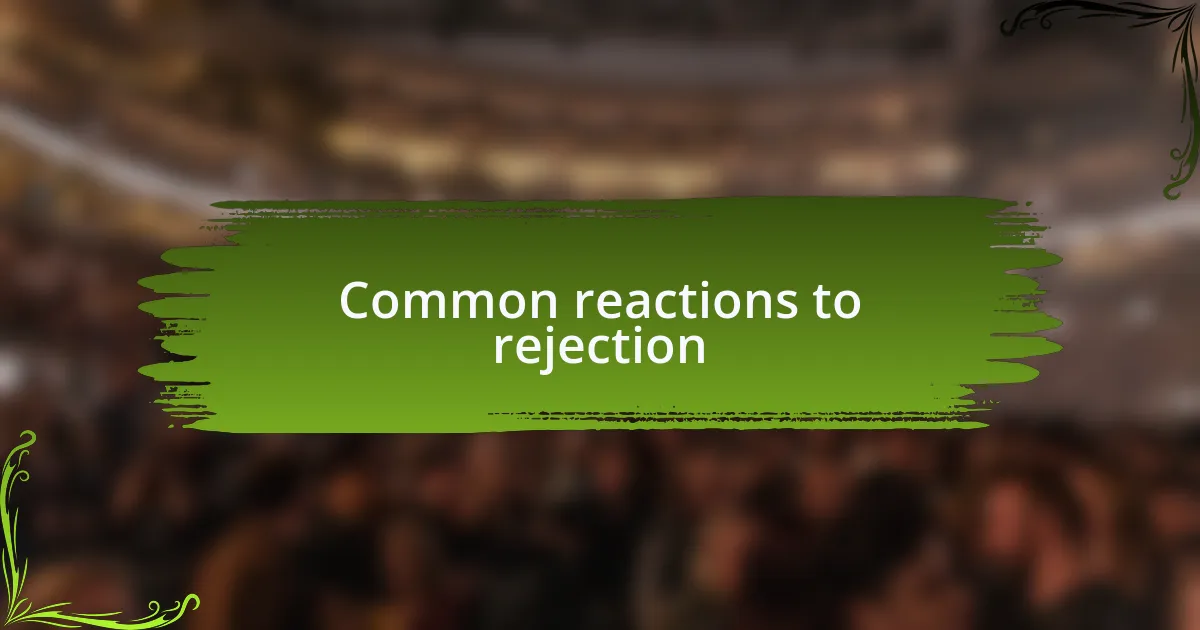
Common reactions to rejection
It’s fascinating how people respond to rejection, isn’t it? For many, the initial reaction might be disbelief or anger. I recall a particularly harsh rejection where I felt rage bubbling inside me, feeling like I was shouting into the void. Did I not pour enough passion into that piece?
Another common response is introspection, where one spirals into self-doubt. After a few months of facing rejection, I started to nitpick at every detail of my writing, questioning whether I even belonged in the industry. It’s hard to separate your worth from your work, isn’t it?
Then there’s the urge to share those feelings of disappointment with friends or colleagues. I remember having a coffee chat with fellow writers who’d faced similar letdowns. We laughed, cried, and sometimes raged together over rejections while reminding each other that this is all part of the journey. Doesn’t it make you feel a little lighter to share your struggles with others who genuinely understand?
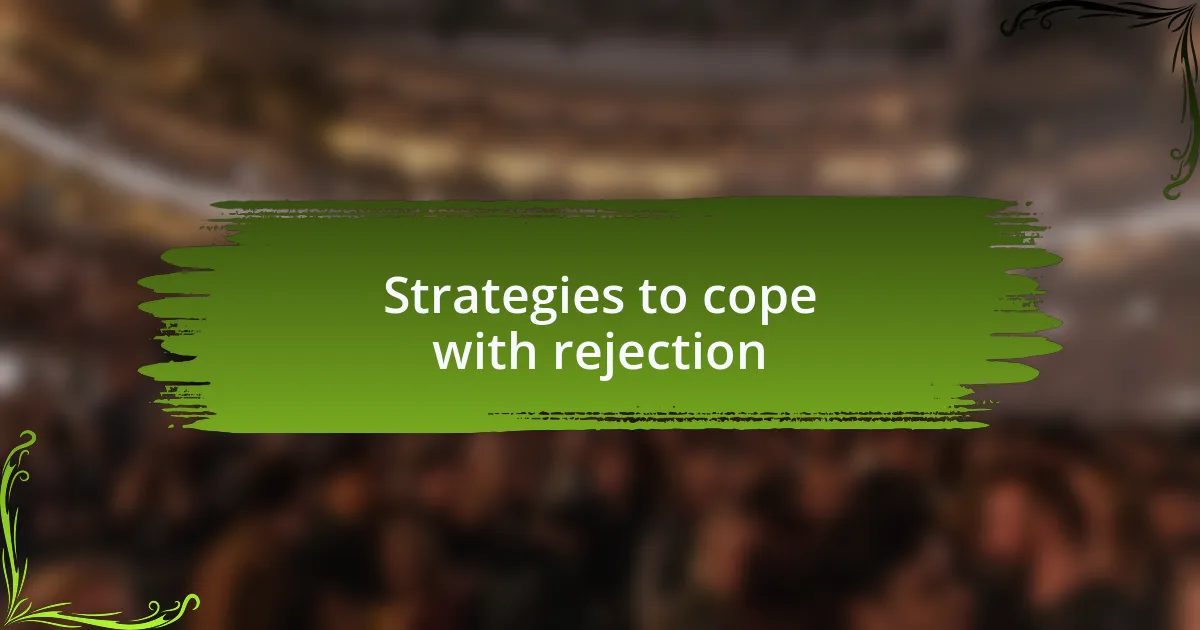
Strategies to cope with rejection
When it comes to coping with rejection, I find that reframing the experience can be incredibly helpful. Instead of viewing a rejection as the end, I try to see it as a stepping stone towards improvement. For instance, after a particularly tough piece was turned down, I took a step back and asked myself, “What can I learn from this?” This shift in perspective allowed me to feel empowered rather than defeated.
Another strategy I lean on is establishing a routine that includes creative expression, regardless of external validation. I remember setting aside time each week to write just for myself, without the pressure of submission. This ritual not only helped me reconnect with my passion for writing but also reminded me that my voice matters, irrespective of whether it gets published or not. Have you ever considered how focusing on the joy of creation could change your experience with rejection?
Lastly, I believe in the power of community support during these tough moments. Staying connected with fellow creatives can provide a comforting reminder that rejection is a shared experience. I once joined a writers’ group where we exchanged stories about our failures and personal victories. Hearing others recount their struggles allowed me to feel less isolated in my own disappointments, opening up new avenues of encouragement and motivation. How has your community helped you navigate similar challenges?
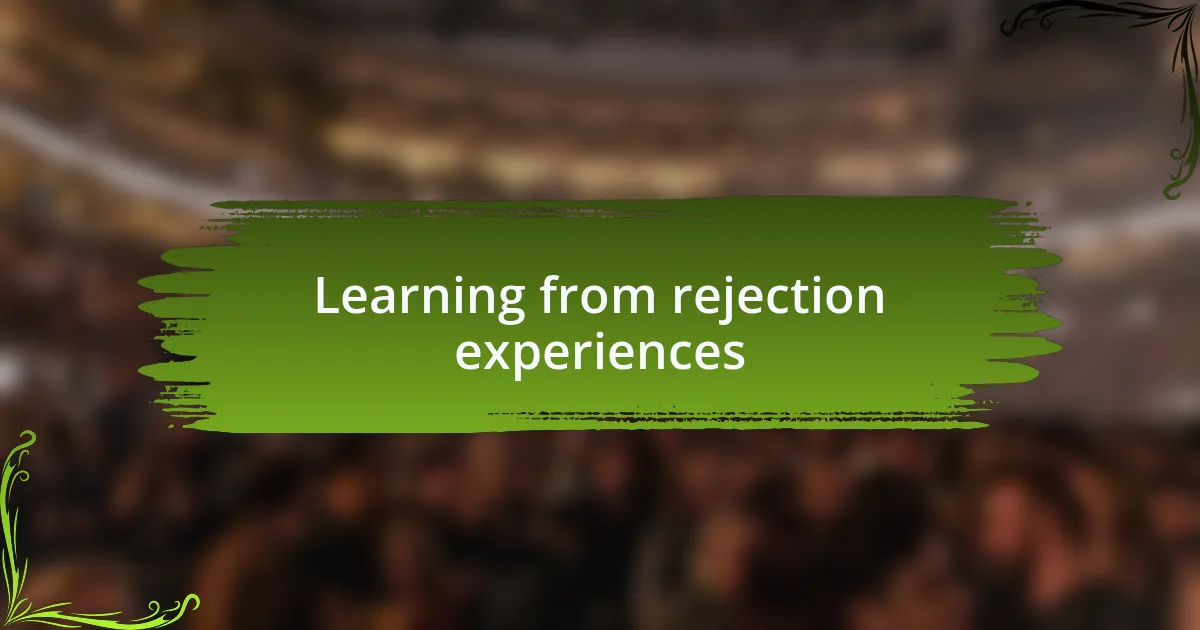
Learning from rejection experiences
Reflecting on rejection can be a profound experience. I remember walking away from a music festival review that didn’t get picked up. Instead of dwelling on the disappointment, I took time to analyze what aspects I may have overlooked. This experience highlighted areas for growth, such as deepening my analysis of the performance’s nuances. Have you ever noticed that a single rejection can lead to a deeper understanding of your craft?
In my journey, I’ve discovered that feedback, even when wrapped in rejection, is invaluable. There was a submission I worked on for weeks, pouring my heart into it, only to receive a “not at this time” response. Yet, the editor provided a few notes that pointed out the strengths and weaknesses of my approach. Embracing this feedback sparked some of my best ideas for future projects. How frequently do we allow others’ insights to shape our paths forward, even amid disappointment?
I’ve also found that sharing my rejection experiences can lead to unexpected learning moments. Recently, I attended a panel where seasoned music journalists openly discussed their toughest rejections. Listening to their stories made me realize that everyone, even the most successful, faces rejection regularly. It’s a humbling reminder that learning from our rejections can not only foster resilience but also create connections with others who have walked the same challenging path. Have you ever felt more empowered simply by sharing your story?
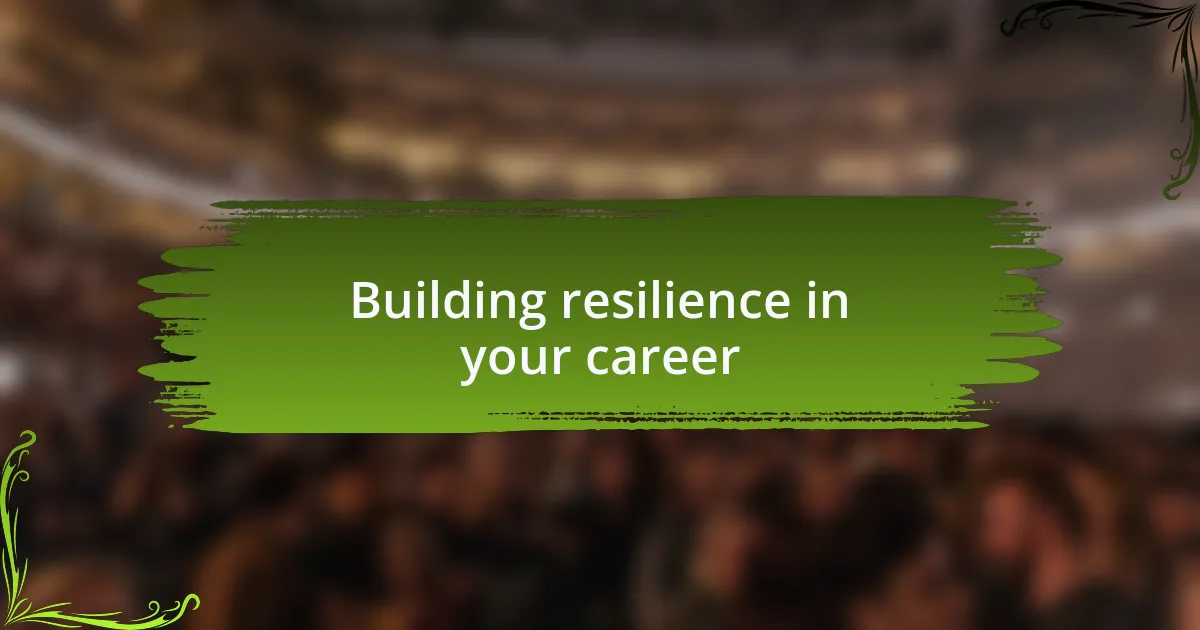
Building resilience in your career
Building resilience in your career requires a commitment to continuous personal growth. I recall a time when my pitch for an album review was met with silence. Initially, I felt crushed, but that silence pushed me to reinvent my approach. I began to study the successful pieces around me and realized that embracing different styles could broaden my skill set. How often do we underestimate the power of stepping outside our comfort zones?
Another crucial aspect of resilience is maintaining a supportive network. I’ve found that discussing my setbacks with fellow writers not only offers encouragement but also diverse perspectives. One evening, I gathered with a few friends who also faced rejection. They shared their own stories and we laughed about the absurdity of some rejections. That camaraderie made each setback feel a little lighter. Isn’t it refreshing to be reminded that we’re not alone in this journey?
Lastly, I believe it’s essential to cultivate a mindset that views rejection as part of the learning curve. I once submitted an article that I thought was my best work, only to receive a critique that stung. Instead of seeing this as a failure, I chose to see it as a stepping stone. That moment of vulnerability fostered adaptability, allowing me to embrace constructive criticism rather than shy away from it. Have you ever considered how turning rejection into an opportunity can transform your outlook on your career?
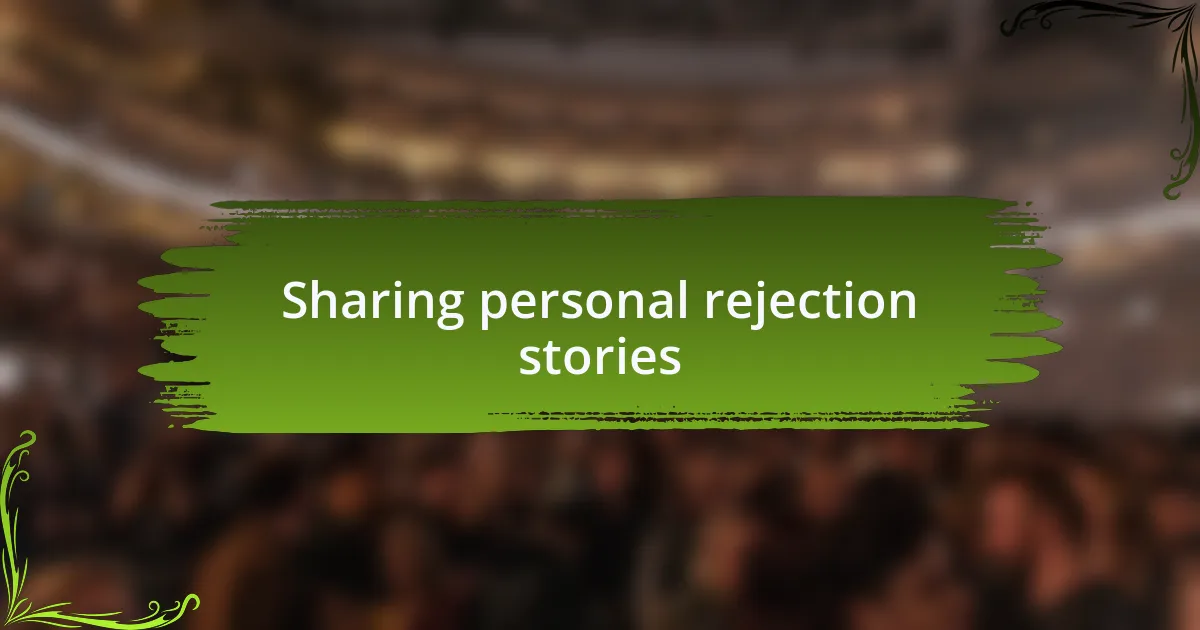
Sharing personal rejection stories
I remember the first time I submitted my work to a major publication. I felt a rush of excitement, only to have that excitement crushed by a polite rejection email. As I reread their feedback, something inside me shifted. I realized that every rejection was a chance to hone my voice and refine my craft. Have you ever felt that deep disappointment, only to find it was the catalyst for growth?
Rejection in the art world can sometimes feel deeply personal, like a reflection of my worth. There was a piece I poured my heart into, believing it would resonate with readers. When it didn’t find a home, I questioned my talent. Yet, as time passed, I learned that rejection often stems from circumstances beyond my control. Isn’t it interesting how one experience can alter our perspective on the myriad of variables influencing a piece’s success?
Sharing stories of rejection with peers has often woven a thread of empathy between us. I vividly recall a candid discussion at a local café, where friends shared tales of their own rejections. Each story shed light on the commonality of our experiences. Through laughter and shared understanding, we transformed our disappointments into lessons, reinforcing the idea that we are collectively navigating this unpredictable journey. Don’t you think that community support can make the weight of rejection feel a little lighter?